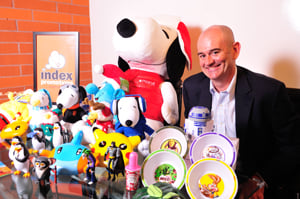While you might associate promotional marketing firms with free pens, West L.A.’s Index Promotions Inc. has always thought bigger. And its new business line is taking that to a whole new level.
While the company built its business designing and manufacturing custom toys and merchandise for clients such as Burger King and Nestlé, it’s now trying to carve out a piece of the lucrative theme park industry – a market that has seen the opening of Walt Disney Co.’s Shanghai Disney Resort and Universal Studios Hollywood’s Wizarding World of Harry Potter in the last few months alone.
Charlie Gaffney, founder and chief executive of Index, said the firm saw an opportunity to increase business by servicing the growing number of amusement parks at home and abroad.
“There is explosive growth going on,” Gaffney said. “Our company has very direct skills that we believe can help theme parks bring in new customers, increase average ticket sales in concession areas, and bring innovation to their retail stores.”
Index also recently shipped out products for Knott’s Berry Farm parent company Cedar Fair Entertainment Co. of Sandusky, Ohio, and Merlin Entertainments Inc., the U.K.-based operator of Legoland and other theme parks, which will appear in stores next month.
“We’re now in a phase where we’ve gotten our infrastructure built to handle the level of business that we have,” Gaffney said. “We’re really aggressively hunting (for customers) again.”
The U.S. amusement park industry generated about $16 billion last year and has seen strong growth over the past five years, according to an April report by research firm IbisWorld. The study said much of that growth is due to the rise of operators using intellectual property rights from major films and entertainment franchises.
Dennis Speigel, president of Cincinnati consulting firm International Theme Park Services Inc., said Index is entering the industry at a ripe time.
“Intellectual property has never been bigger or hotter or more important in theme parks than it is currently and that’s domestically and internationally,” Speigel said. “Look at Universal with Harry Potter, Disney with ‘Star Wars,’ Cedar Fair with Snoopy, Six Flags with DC characters – they’re all capitalizing on this in ways they’ve never really thought of before.”
Happy meals
Founded by Gaffney in 2002, Index initially focused on serving the European market working through its partnership with Quick, one of the largest fast-food hamburger chains in France and Belgium.
Index’s deal called for it to design custom toys for Quick’s children’s meals. That relationship helped the firm snag a deal with 3G Capital, Burger King’s parent company, in 2012 to become that restaurant’s global supplier of children’s meals.
Index has since grown to 50 employees with revenue of just under $100 million. It also has offices in Chicago, Hong Kong, London, and Paris. The company works with clients to design custom toys or merchandise based on the customer’s intellectual property. Once a design is complete, products are manufactured in China. It creates everything from toys found in cereal boxes to a recent summer giveaway with the San Francisco Giants offering fans a collectible lifelike doll of right-fielder Hunter Pence.
Its most recent work includes a line of Snoopy plush toys for Knott’s Berry Farm, which will be available for purchase at the park next month. It also created a series of products, including specialty mugs, for the giant Ferris wheel attraction Orlando Eye, which is owned by Merlin Entertainment.
In addition, Index is making a push to add digital components to its products. For example, the agency developed a plush toy for Aflac Inc. that comes with a mobile-gaming app developed in-house by Index. The toy is sold at Macy’s and also donated by Index to pediatric cancer centers during the holidays.
New theme
Index opened its Hong Kong office in 2010 to help oversee its supply chain in Asia and more effectively meet increased demand. As the theme park industry expands in the Asia-Pacific region, Index sees itself as having a competitive advantage over other promotional marketing firms through its outpost there.
Despite the theme park construction boom, Gaffney said there are still challenges to operating as a vendor in the industry, including a lengthy and complex process to receive approval from individual operators.
And competition is rife, said Spiegel.
“There are a lot of companies who produce intellectual property materials,” he said. “It would’ve been easier 10 or 15 years ago than today because the parks are becoming more sophisticated in this arena.”
Orders from theme parks are also typically smaller compared with clients such as Burger King, though the business relationship doesn’t end after one campaign.
“With theme parks the opening order might be 20,000 units,” Gaffney said, “but they typically renew when they run out of inventory and the same item stays in the park for several years.”
Index said the percentage growth from its theme park business has only been nominal so far because it only began shipping items to parks this year. But the firm does expect that number to increase significantly in 2017.
“We know how to bring consumers into the restaurants, into the grocery store aisles to buy cereal,” Gaffney said. “We believe that we will be able to add that experience into the theme park channel as well.”

